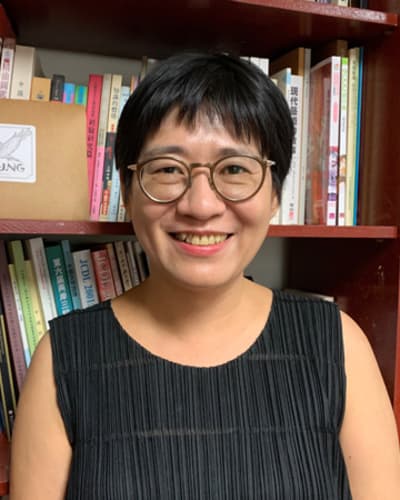Best Practices Part 1
- Starts at
-
04 Oct 22 21:45 UTC - Finishes at
-
04 Oct 22 23:30 UTC - Venue
- Virtual Conference Room A
- Moderator
- Jian Qin
Moderator
-

Jian Qin
Syracuse University, USA
Jian Qin is Professor at the iSchool at Syracuse University. She conducts research in areas of metadata, knowledge and data modeling, scientific communication, research collaboration networks, and research data management. Her research has received funding from IMLS to develop an eScience librarianship curriculum and from NSF for the Science Data Literacy project. Jian Qin directs a Metadata Lab that focuses on big metadata analytics and metadata modeling and linking.
Presentations
Modeling Fieldwork Data of Human Ecology: A Case Study of the Social and Cultural Survey of Rural Taiwan
The report highlights how a metadata application profile and has been designed on the basis of Schema.org and Dublin Core Terms to support Fieldwork Data of Human Ecology. The talk also demonstrates the implemented system, the LOD set and how SPARQL enhances the data access.
-

Sophy Shu-Jiun Chen
Academia Sinica
Sophy Shu-Jiun Chen is the Assistant Research Fellow at the Institute of History and Philology, Academia Sinica, and also the Executive Secretary of Academia Sinica Center for Digital Cultures(ASCDC). She received her M.A. degree in Information Studies from the University of Sheffield, UK in 1997, and Ph.D. degree in Library and Information Science from the National Taiwan University in 2012. Dr. Chen is also an Adjunct Assistant Professor of the Department and Graduate Institute of Library and Information Science, National Taiwan University. Her research interests include digital libraries, metadata, ontologies, Linked Data, knowledge organization, and digital humanities. She initiated the Research Project of Chinese-language AAT (Art & Architecture Thesaurus)( https://aat.teldap.tw/) with the Getty Research Institute, USA since 2008, and the Linked Open Data Lab in Academia Sinica (https://lodlab.ascdc.tw/).
NLK's follow-up project for an automatic Subject Indexing and the role of metadata librarian
This year, the National Library of Korea (NLK) attempted to automate subject indexing to improve cataloging efficiency. In cooperation with Kyungpook National University's research institute, we analyzed our bibliographic data, authority data, table of contents, and full text. Then we developed an algorithm to recommend subject terms based on learning our data, and verified its possibility and suitability as a cataloging assistant tool. In DCMI-2022, I would like to share our research results and also talk about how the librarian was involved in the research process and what points to keep in mind.
-

Lee, Miso
National Library of Korea (NLK)
I have been working at the National Library of Korea Metadata & Sustainable Access Division since 2017. Since 2020 I have been working on managing subject authority data and uniform title authority data. Also, I am in charge of publishing a national bibliography once a year, and at the same time researching a bibliographic data service. In the future, I will prepare authority data and various vocabularies to be converted into Entity, which I expect will help to convert library data into linked data. We believe that this work will also contribute to the advancement of library data services.
Hashtagging: CLAPAM Facebook Page Social Metadata Usage
This presentation will concentrate on how to leverage user social metadata, or hashtags, on a Facebook community page. The decision to use hashtags phrases was influenced by a number of variables, and the development of the hashtag process flow in Cleft and Palate Association Malaysia (CLAPAM) is also explored.
-

Mazwani Ayu Mazlan
Faculty of Information Management, Puncak Perdana Campus, Universiti Teknologi MARA Malaysia
Mazwani Ayu is a senior lecturer who has worked at Universiti Teknologi MARA (UiTM) Malaysia for 11 years in the Faculty of Information Management, where she has taught information organization subjects such as descriptive cataloging, cataloging and classifications, abstract and index, and metadata in information electronics, compatible with 5 years of experience in the industry in the field of information and science libraries. Her research interests include the organization of social metadata or social tags in social communities in social media, knowledge management in social media, content marketing in social media, and gamification in content management.
Extracting and describing seals in digital images of Chinese rare books
Seals on Chinese rare books are usually compared to bookplates in the western world. They represent the track of the transmission history from their homeland to overseas. However, extracting and recording seals from Chinese rare books is always a challenge for Chinese rare book cataloging.
This experiment project intends to develop a model to identify seal marks from Chinese rare book digitization images. The project comprises two phases. The first stage is to extract seal marks from images that we collected from UC Berkeley Library Chinese rare book digital collections. The project plans to train 200-300 images, including 400 seals, based on the Mask-RCNN model. The second phase will explore a model to recognize keywords in seals. These keywords will help us to recognize the contents of the seals and finally will help us to trace the ownership history of Chinese rare books
-

Haiqing Lin
UC Berkeley
Haiqing Lin is the head of technical services, East Asian Library, UC Berkeley
Use Ontology to Promote the Demonstration of Digital Memory: From Data Visualization to Immersive Interactive Experience
After a long-term digitization process, the resources of cultural memory
institutions (GLAMs) have been digitized, and the contents of many
resources have also been transformed into text, semi-structured and
structured, and even semantic data. The physical cultural memory
resources have become multi-media and multi-mode digital memory
media. The demonstration methods of GLAMs have also begun to use
multimedia and data visualization technologies. With the popularity of the
concept of Metaverse, various technologies and applications supporting the
vision of Metaverse have been brought to GLAMs practitioners, such as
Blockchain, Interactivity, Games, AI, and the Virtual Digital
Human(Metahuman), NFTs, etc. Data visualization allows the audience to
freely switch macro, meso, and micro perspectives to study large-scale
resources and data, while the immersive interactive experience mode
advocated by applications (e.g., Metahuman) in the Metaverse is easier to
establish emotional links with the audience, so as to better convey the
cultural value of resources. This presentation will share the practice and
exploration about data visualization and immersive interactive experience
for demonstration of Digital Memory and how Metadata or Ontology can
help to enrich the data semantics and to build a digital memory model for
Metahuman in the Metaverse environment. The intended audience includes
anyone who is interested in the application of visualization and interactive
technologies driven by semantic data in Glams area.
-

Cuijuan Xia
Shanghai Library
Cuijuan(Jada) Xia is a Researcher at Shanghai Library. She has taken mainly part in developing and designing DH(Digital Humanities) projects. She hosts and participates in many national research projects. Her research focuses on Metadata, Ontology, Knowledge Organization, Linked Data, Digital Humanities, Cultural Memory,and Metaverse Applications in Glams and DH area. She has published 3 books and more than 70 papers in the Journal of Library Science in China, Journal of Academic Libraries, Library Tribune, Library Journal, Library and Information Science and other academic journals. E-mail: xtykc@yeah.net.

